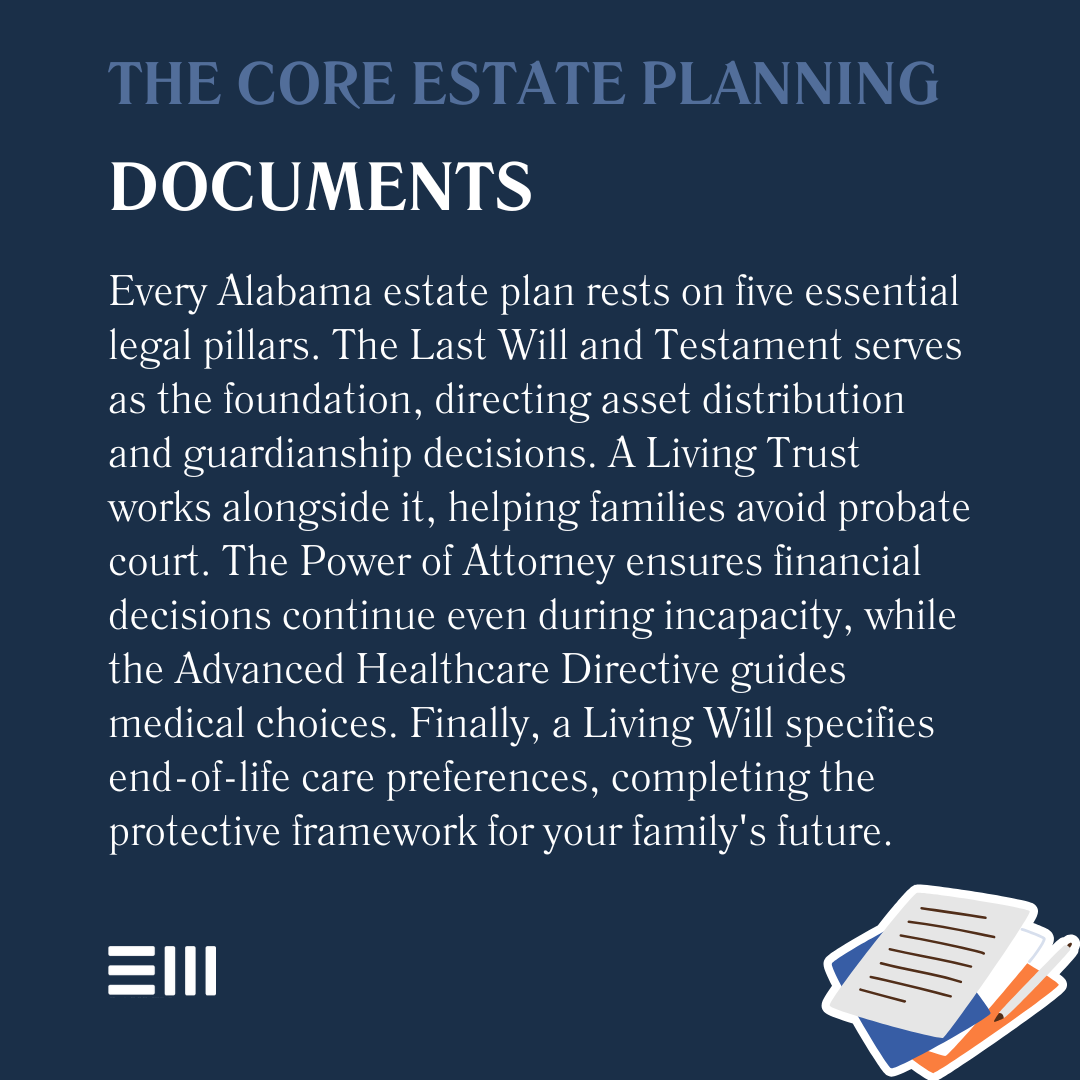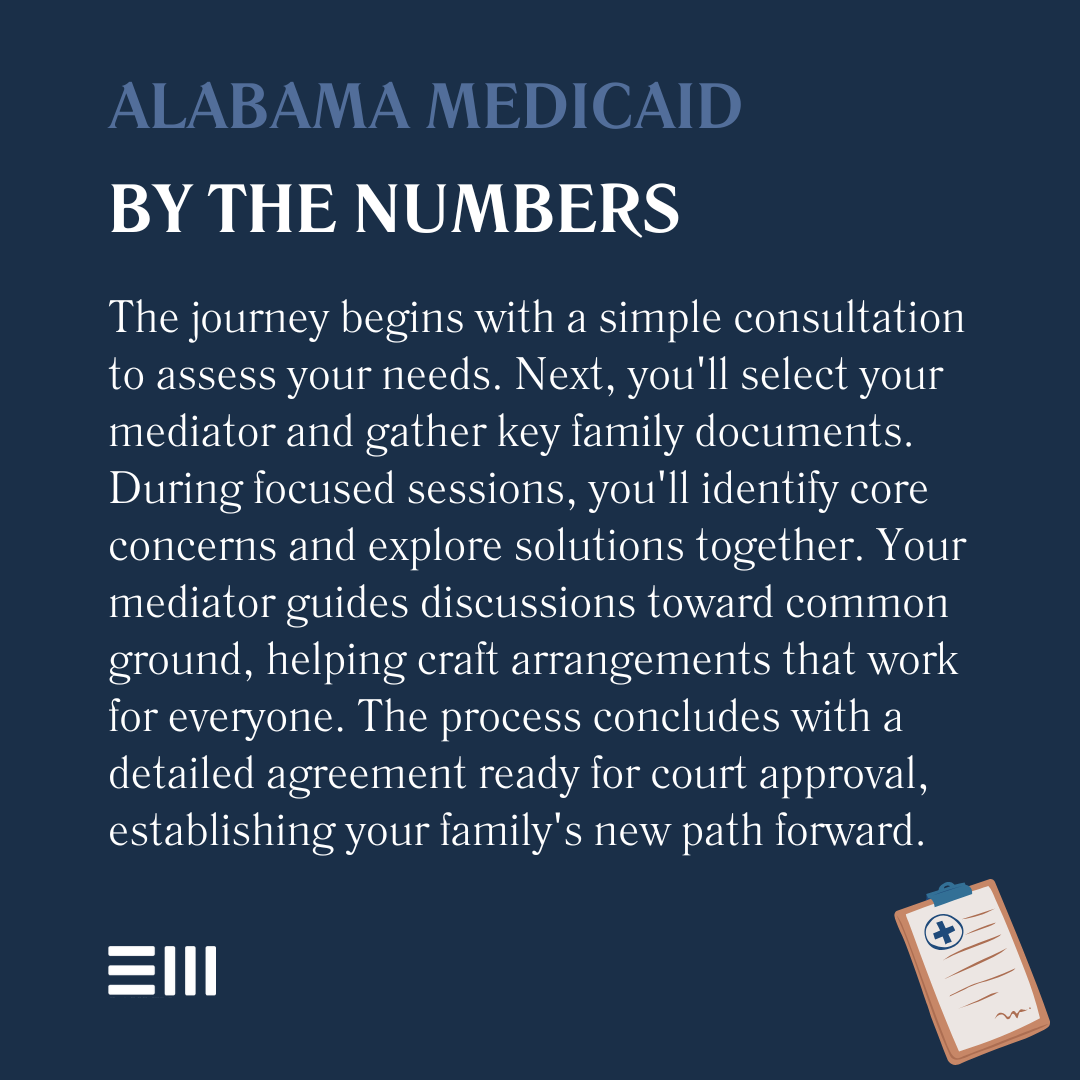Nearly 70% of Americans over 65 will require long-term care services in their lifetime, yet only 11% have taken steps to protect their assets through proper estate planning and Medicaid qualification strategies.
In Alabama, where nursing home costs average $7,604 per month, understanding how to navigate both estate planning and Medicaid requirements becomes a financial imperative for families seeking to preserve their legacy while ensuring access to quality care.
Understanding Estate Planning in Alabama
Recent surveys reveal that 60% of Americans lack a basic will, potentially leaving their families vulnerable to lengthy probate processes and unintended asset distribution.
The complexity of modern families and digital assets has made comprehensive estate planning more important than ever. The following core documents form the foundation of a solid estate plan in Alabama:
- Last Will and Testament - Outlines asset distribution and guardianship
- Living Trust - Enables asset transfer while avoiding probate
- Power of Attorney - Designates financial decision-making authority
- Advanced Healthcare Directive - Specifies medical care preferences
- Living Will - Details end-of-life care wishes
- HIPAA Authorization - Allows access to medical information
- Letter of Intent - Provides guidance to executors
- Beneficiary Designations - Ensures proper asset transfer
These documents work together to create a comprehensive shield for your assets and wishes, but they require regular review and updates as life circumstances change.
Alabama Medicaid Eligibility Requirements
Recent changes to Alabama Medicaid policies have made qualification more complex, with strict income and asset limits that require careful navigation.
Understanding these requirements is essential for developing an effective long-term care strategy.
Income Limits
The Alabama Medicaid program sets specific income thresholds that determine eligibility.
Here are the current guidelines:
- Individual monthly income cap: $2,487 (as of 2024);
- Married couple considerations vary based on living arrangements;
- Miller Trust options for excess income;
- VA benefits calculations;
- Social Security income treatment; and
- Pension income considerations.
These income limits represent the starting point for eligibility determination, but various legal planning strategies can help manage excess income effectively.
Asset Limits
Alabama Medicaid maintains strict asset limits, but not all assets count toward these limits.
Current guidelines include:
- Single individual: $2,000 in countable assets
- Married couples: Community spouse can retain up to $148,620
- Primary residence exemption up to $688,000 in equity
- Personal property allowances
- Vehicle exemptions
- Burial account provisions
Understanding these limits helps families make informed decisions about asset preservation while maintaining Medicaid eligibility.
Asset Protection Strategies
Protecting assets while qualifying for Medicaid requires careful planning and timing.
The right combination of legal strategies can help preserve wealth for future generations while ensuring access to necessary care.
Consider these proven approaches:
- Irrevocable Trusts;
- Strategic gifting within look-back periods;
- Annuity purchases;
- Real estate transfers;
- Life estate deeds;
- Qualified Income Trusts;
- Spousal transfers; and
- Business succession planning.
Each of these strategies presents unique advantages and considerations, requiring careful evaluation based on individual circumstances and goals.
Frequently Asked Questions About Estate Planning & Medicaid in Alabama
Estate planning and Medicaid qualification generate numerous questions from Alabama families seeking to protect their assets and ensure quality care.
Below are detailed answers to the most common inquiries we receive:
How Early Should I Start Estate Planning?
Estate planning ideally begins when you acquire significant assets or start a family. Early planning provides more options for asset protection and Medicaid qualification strategies.
The process should evolve as your life circumstances change.
What Assets Are Protected from Medicaid Spend-down in Alabama?
Alabama Medicaid exempts certain assets from spend-down requirements, providing important protections for families:
- Primary residence (with equity limits);
- One vehicle;
- Personal belongings and household items;
- Life insurance policies under $1,500;
- Burial plots and prepaid funeral arrangements;
- Income-producing property (with limitations); and
- Certain retirement accounts.
These exemptions offer valuable opportunities for protecting family assets while maintaining Medicaid eligibility.
Can I Give Away Assets to Qualify for Medicaid?
Transfers must comply with Medicaid's 5-year look-back period. Improper transfers can result in penalty periods of ineligibility. Working with an experienced elder law attorney helps ensure compliant transfers.
How Does Marriage Affect Medicaid Eligibility?
Marriage significantly impacts eligibility through spousal impoverishment protections and resource allowances, requiring specialized planning strategies.
Recent regulatory changes have expanded spousal protection options.
What Happens if I Need Nursing Home Care Before Completing Estate Planning?
Crisis planning options exist but offer fewer protective strategies than advance planning. Immediate action with professional guidance is essential for preserving assets and securing care.
Legal Considerations and Deadlines
Understanding and meeting legal deadlines is crucial for successful estate planning and Medicaid qualification in Alabama.
These timelines affect your options and outcomes:
- Five-year look-back period for asset transfers;
- Annual Medicaid renewals and reporting requirements;
- Regular estate plan reviews and updates;
- Deadlines for appealing Medicaid decisions;
- Time limits for probate proceedings;
- Notice requirements for trust modifications;
- Tax filing deadlines; and
- Power of attorney updates.
Meeting these deadlines requires careful attention and often professional assistance to ensure compliance and optimal outcomes.
Working With Alabama Estate Planning Professionals
Estate planning and Medicaid qualification involve complex legal and financial considerations. When selecting professional assistance, consider these key factors:
- Experience with Alabama-specific laws;
- Understanding of local probate courts;
- Knowledge of regional Medicaid offices;
- Track record of successful planning;
- Continuing education commitment;
- Professional organization membership; and
- Client communication practices.
The right professional partnership can significantly impact your planning success and peace of mind.
Secure Your Future
Don't leave your family's financial security to chance. Our experienced elder law attorneys can help protect your assets while ensuring access to essential long-term care.
Contact us today for a confidential consultation to discuss your estate planning and Medicaid needs.


